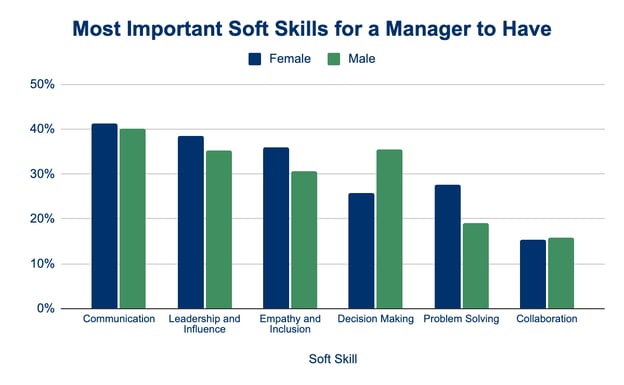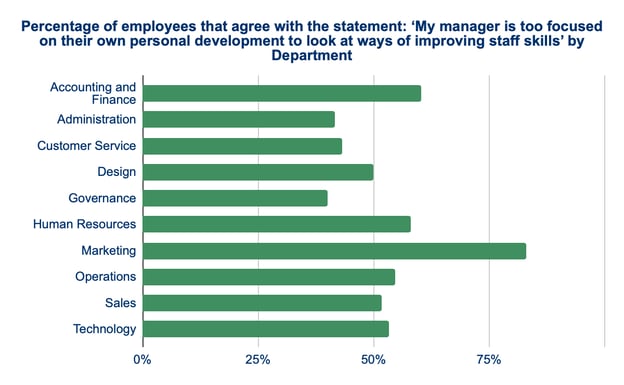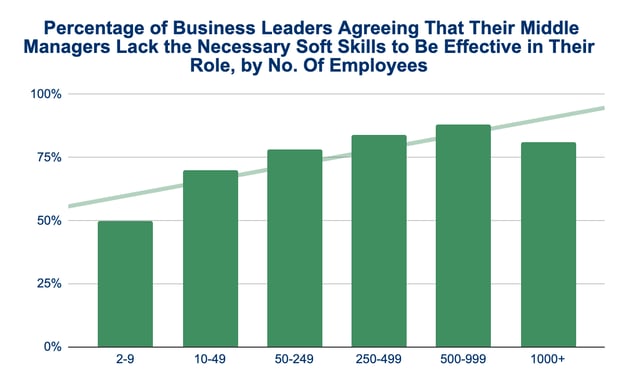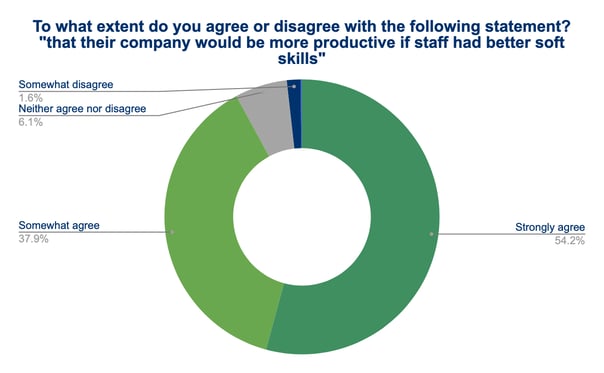Managers come under fire a lot. So much so that our CEO, Alexander Fahie, wrote an article about it recently. But at Ethical Angel, we aren’t here to echo what everyone else is saying about middle managers and why their time in the business world is limited. We want to understand what the current issue is with management, where the skills gaps are, and how these gaps can be closed. After all, managers are critical to keeping employees motivated whilst providing the vital link between business leaders and the employees on the ground and subsequently they should be set up with the vital technical and soft skills needed to fulfil their role.
So, we decided to dig deeper by conducting research with over 2000 employees and business leaders. One trend stood out, both employees and business leaders were dissatisfied with managers, and the real crunch point was soft skills.
In this article, we dive further into the data from both employees and leaders, covering the key statistics, and discussing what can be done to improve the soft skills of a manager.
What Employees Say About Their Manager's Soft Skills
A good manager is crucial in providing employees with the tools needed to learn, excel and ultimately succeed in achieving both their individual development and overall business goals. However, our research has found that a lack of soft skills in management is widely prohibiting this from happening with the general trend being that employees are dissatisfied with their managers.
Respondents were first asked to rank the three soft skills that they believed were most important for a manager to have.

40% of respondents said that communication was the most important soft skill for a manager to have, with leadership and influence coming in as the second most important. Interestingly, there was a split in opinion between men and women for the third most important skill. As 36% of women rated empathy and inclusion as the third most important skill, whereas 35% of men considered it to be decision-making.
Concerningly, the research also found that 41% of employees rated their managers’ communication skills as average to very poor, suggesting there is a real deficit between the communication skills that many managers have vs. what they need. This is clearly something that needs rectifying considering it is ranked as the most important soft skill among employees in the workplace. The deficit may also begin to explain a lack of productivity among employees, as 50% of women and 56% of men said that they would be more productive if their manager had stronger soft skills.
The findings do not stop there though.

As mentioned previously, an effective manager should act as the catalyst to motivate employees and strengthen their skills, but our research found that this simply isn't occurring. 62% of the employees we spoke to said that their manager has never looked at ways to improve their soft skills, with 51% of employees believing that their managers are too focused on their own development to look at ways of improving staff skills. One standout statistic, which is worth mentioning, is that this statistic increases to 83% among marketing employees. When marketers’ roles revolve around numerous soft skills such as creativity, communication and problem-solving.
The impact of employees not getting the learning and development opportunities they need can be huge, leading to poor productivity alongside a possible increase in employee turnover.
Leaders' Thoughts on The Soft Skills of Managers
Our research also looked at the view of business leaders. Managers play a huge role for the c-suite as they translate business strategies into actionable plans for employees.
Our research found that, like employees, business leaders are not satisfied with their managers' soft skills, with one standout statistic from the research being: 79% of business leaders believe that managers lack the soft skills needed to be effective in their role, showing that managers don’t have the skills needed to fulfil their role and are in dire need of an effective soft skill development programme.

This data shows that all managers are in need of support, but what happens when we look at managers' soft skills by company size? Unsurprisingly, as businesses get bigger, so do the problems, with an increasing number of leaders suggesting managers lack the necessary soft skills to be effective in their role as company size increases. However, the data did show a small reduction from leaders in businesses with 1000+ staff, suggesting that larger businesses are finding a way to use their additional resources to improve manager soft skills. An example of this is the work we have done with PepsiCo to support employees to overcome a number of their soft skills challenges, which in turn improved their soft skills by 54%.
The easy option here is to blame managers for simply not having the soft skills. However, leaders believe the blame lies with the availability of learning opportunities in the workplace. 74% said that they have clever and competent staff, but they do not get the leadership opportunities they need to progress to more senior positions. Proving that it’s not the manager's fault that they don't have the skills required to carry out their role; they are simply not getting the help and support that is needed. This is despite business leaders recognising the benefits that can come from an effective soft skills programme, with 92% of leaders saying that their company would be more productive if staff had better soft skills.

This just goes to show how supporting managers with their soft skills development should be of the utmost importance. Managers are progressing into positions of leadership without the soft skills that are required from a confident and effective manager leading to shortfalls arising in themselves, employees and perhaps most importantly, business growth.
Something Needs to be Done, and Managers Agree...
Overall, our research has shown that both senior and junior staff are feeling the impact of a lack of soft skills in management that are ultimately affecting businesses’ bottom line.
You may think that managers are in the firing line from c-suite and employees...but they agree, with a recent study stating that 75% of managers were dissatisfied with their company's L&D function.
So what does this all mean?
- Senior leaders are unhappy
- Employees are unhappy
- Managers are unhappy
And the reality is, this unhappiness is going to land at the feet of L&D if strategies aren’t put in place to significantly improve managers’ soft skills. With record investment in L&D the time to act is now, before senior leaders start to question if their investment is better placed elsewhere.
